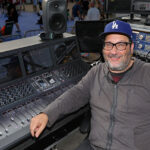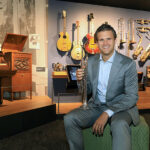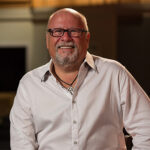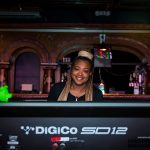Martin Walker is one of those "go to" guys when you are looking for someone who understands what a real rock band is supposed to sound like. That list ranges from Whitesnake to Mastodon to more than 10 years with Judas Priest.
We caught up with him in Las Vegas, where he was caring for Slash and his band opening for Ozzy Osborne. I was – as is the norm – late getting to the venue, and Martin had just finished sound check and had a full plate because Slash and friends were due to break away from the Crazy Train the following day. Ozzie and crew had the next day off, but Martin and monitor engineer Monty Carlo were looking at an eight-hour drive to Salt Lake City where Slash was scheduled to do a club date the following night. Somehow he found the time to talk with us about real rock bands, the proper mic for a Marshall amp, and why he hates digital plug-ins.
FOH: How did you end up behind a mixing desk? What was the journey? I was the guy in the band who owned the PA. Was that your path, or did you take a different road?
Martin Walker: I was a guy in a local band who made the PA rental cheaper by offering to help load in and out. From there, I just naturally ended up behind a mixing desk one day and decided it was more fun and financially rewarding than being on stage…and that was back in the very early 1980s in England, which was a great time and place for live music, following the changes that English Punk Rock brought about…
How did you get the Priest gig in the first place?
A very close friend (Ian Day – current Iron Maiden tour manager) was the production manager, and he had been asking me for years to join the Priest family. I kept turning it down as I had other things going on, and to be honest, didn't really find it that enticing at the time. When I finally joined, I was kicking myself for a long time for not joining the first time I was asked – I quickly learnt it was a fantastic family to be part of.
My understanding is that you do a bunch of acts, but that Priest is your main one. With this being a farewell tour, are you starting to look at what's next?
I have to be honest and say I'm nervous as to what's next… I'm always looking, and always open to new projects, but for the past 10 years or more, I've always had JP in my back pocket, and everything else has had to fit in, but after this, who knows…
The story about you hooking up with Pooch and Tater about the Slash gig was great.
I was in the U.S. on tour with Mastodon, and we played a festival in Columbus Ohio – Slash was on mid-afternoon on the main stage; we headlined the second stage, late afternoon. I spent the day hanging backstage at the main stage with my friend and hero Bryan Worthern (we did Foo Fighters in Europe together) and Pooch and Tater [Ken "Pooch" Van Druten, FOH engineer; and Kevin "Tater" McCarthy, Monitors engineer], who were taking care of all sound duties on Slash.
They asked me if I was looking for work, as they had been "recalled" to their main gig, Linkin Park, later in the year, and had to find replacements to look after the Slash gig. I said, "Yes, of course," and so Pooch said, "Let's go meet the tour manager – I'll introduce you; it's the first step."
So off we went, and as the dressing room door opened, the tour manager said, "Hi, Martin, how you doing – Hey, are looking for work?" at which point Pooch was rather confused, until we explained that we knew each other – Pete Merluzzi [the tour manager]'s wife was the wardrobe girl on previous Whitesnake tours I'd done. I replied "Yes," and the gig was sealed.
How does mixing Slash differ from Priest? I know Rob [Halford, lead vocalist for Judas Priest] is a total belter, and the kid with Slash [Myles Kennedy] seems to sing much softer. How do you get vocals up above the onstage guitar din? Even at sound check, that had to be close to 100dB coming off the stage with the PA not even turned on.
Mixing Slash is fairly straightforward, there's very few bells and whistles, the band play well, are very tight, very talented and have simple yet suitable sounds. There are two issues mixing Slash – get the guitar sound right, and loud enough, and get the vocals over the top. That's it, everything else falls into place after that, without too much effort. Myles is a great singer, and has a very distinctive vocal, but not a lot of power, and I don't think he will be surprised or disappointed to read this…he knows, he's a very down-to-earth guy, and there's no pretense about him. He does what he does, very very well, but just doesn't have that huge powerhouse vocal… He covers the Axl Rose songs very well, better than I can imagine anyone else I know of doing, and his vocal strength is in the same high-mid range that Axl has, but getting that over a rock band that plays at typical rock band levels can be very tough at times. His vocal, the snare drum, the rhythm guitar and Slash's guitar are all fighting for the same place in the mix… I have to pull all the tricks I've learnt over the years to pull it off, and sometimes I even succeed!
I have to admit, mixing Judas Priest is totally different. Here, I'm dealing with guys who have onstage sounds that they've honed over 35 years or more, and a singer that delivers a level of vocal that most engineers can only dream of, even on Rob's off nights – and they are few and far between. It's a fairly easy duty.
I'm not knocking Slash and his band in any way whatsoever, it's just that JP are so dialed, the onstage level is very controlled, not necessarily quiet, but very controlled. For example, I don't have a drummer with a massive drum fill firing into the 20-plus channels of drum mics. It's a job that on 99 nights out of 100 is a joy to mix – you can concentrate on some nice effects, or the high hat hit in the third bar of the second song, or the guitar lick from stage left right before the stage right solo, etc., etc. Don't tell anyone, but they pretty much mix themselves; I just stand back and smile.
I know you were doing a club gig in Salt Lake City the day after Vegas while Ozzy had a day off. Is that pretty normal? What kind of extra challenges does that present, especially considering you are also production manager?
I've done double duties on a lot of the gigs I've had for quite some time, cutting my teeth tour managing and doing FOH with no production manager back in the late 1980s and into the early 1990s with U.K. rock band The Almighty. I feel that it comes pretty much second nature to me nowadays – and it certainly helps when looking for work having the multiple strings to one's bow. Doing the clubs/theatres/House of Blues on Ozzy off days was essential to the tour for purely financial reasons. Being an opening act when there's no two shows in a row in seven weeks is extremely expensive – the solo shows have been the tour's saving grace. When I picked up the tour last year, it was essentially a club/theatre tour, so going into those venues now is kind of like a homecoming. All the crew working with Slash are experienced enough and adult enough to deal with whatever is thrown at them, so the change from Arena opener to club headliner is a very easy transition for us. And Slash has a worldwide reputation and respect that precedes us, resulting in venues and promoters generally treating us very well.
Describe your working relationship with Monty. He's a great person to have at the other end of the snake.
I have been very, very lucky for the last few years. I've had Kevin "Tater" McCarthy (Judas Priest and Linkin Park) , John Chadwick (Judas Priest and Luis Miguel) and now Monty Carlo (Slash and Bruce Springsteen) at the other end of the multicore – all very talented, very professional, very friendly and very conscientious engineers. I cannot explain enough how, as a production manager and FOH guy, you have to rely on your monitor guy to take care of onstage sound duties. I rely on them to mic up, wire up and often line-check before I even show up at the FOH position. I think really I owe a lot of my success to these guys – they are all far more knowledgeable than me, and also more fastidious in their method of working than I ever will be – and I humbly salute them! Both Tater and John are unavailable for the first leg of the JP tour this year, and after meeting Monty on this Slash tour, he is the natural successor to those guys, and I look forward very much to welcoming him into the JP family
Any miking or mixing tips? What do you use on Slash's guitar cabinets? What about the lead vocal? Are there mics you automatically go to every time?
I use the new Shure [KSM]313 mic on Slash's guitar cabinets, and look forward to using them later this year on the JP tour – it's an amazing mic that needs very little EQing. Slash, as you can imagine, has great tones coming out of the cabinets, and this mic captures it perfectly without coloring it or altering it in any way. I would highly recommend this mic to any engineer dealing with a good quality guitar sound, other than that, on Slash it's all very simple, very straightforward mics and positioning that you would see on any rock band. I strive to achieve a good sound by doing minimal EQing. My theory is, the less you do, the less you add or take away, the better – right from the input channel to the main system EQ. Designers and technicians far beyond my talents expend a lot of blood sweat and tears (and time) coming up with mics, consoles, processors, amplifiers and PA boxes – so who am I to come along and hack away at the various parameter in the futile attempt to improve on their efforts?
It's simple – if you have a great band giving great signal into great mics going through great consoles into great boxes, you should only really end up with one thing – a great sound. If you introduce just one dodgy link into that chain, you are then going to be working hard, earning your money to end up with a decent result.
What is it about the DiGiCo system you find so attractive? Greg [Price, FOH for Ozzy] was pretty upfront in saying that he is such a Venue guy because of the plug-ins. And I have heard that a lot. What makes you stay with DiGiCo?
I'll start by saying right away that I am very much NOT a plug-in guy… In my opinion, if you want a particular effect, get it. Don't get a virtual representation of it. You want to drink beer? Drink beer, don't drink beer-flavored drinks. You want to eat bacon? Eat bacon, not bacon-flavored representations. You want to drive a good car? Drive a Bentley, not a Lexus… You see where I'm coming from. Plug-ins to me are cop out. No matter what anyone tells you, a computer-generated valve compressor is not the same as a real valve compressor. Period.
On Slash, I have no real need for any outboard gear. The onboard EQ and basic processing on the SD8 is of such quality that I have no need for anything else. On JP, I rely quite heavily on particular effects that simply aren't available on board, and I also find that with certain effects, they only really come alive when slightly overdriven, and the digital domain inside a lot of today's consoles simply doesn't allow you to get to that point – something I could only demonstrate with the gear in front of me, not very successfully here in print.
DiGiCo, to me right now, are the most natural sounding digital consoles, which in itself, to me, sounds like a contradiction, but as analog consoles take a long slow retirement out of our industry, you have to find a replacement for them, and for me, personally, I feel DiGiCo make that replacement honorably.
And DiGiCo was a big change for you…
I don't say this easily. I was very much a Yamaha man and cut my teeth on PM 3000s and 4000s, moving up as soon as I could to the glorious PM 5000… When going digital, I went fearlessly to the PM5D, and enjoyed the learning curve immensely, however I could not make the sound I was so used to – and, on an analog desk found so easy to end up at – come out of that console. As much as I loved its size, its ease of operation and its digital ingenuity, I found the end result just not quite right. I then reluctantly returned to my trusty PM 5000, and although relieved to return to an old friend, at the same time felt in some way defeated.
The next tour came along, and I returned to Major Tom, the PA company I'd been using in the U.K., and asked for my friend the 5000. To my horror, none was available anywhere in the U.K., and Lars Brogaard, MT's owner (and director of DiGiCo – who, on the previous JP outing, I'd made purchase two PM5Ds) talked me into taking a D5, on the understanding that if it didn't work out in rehearsals, he promised to hunt high and low to find me a PM5000. Needless to say, by the end of rehearsals, I'd found two new best friends – the DiGiCo D5 and Lars Brogaard!
When does the Judas Priest tour start, and what is up for you over the next few months?
Judas Priest start rehearsing in May for a tour starting at the beginning of June – I am out with Slash until mid-April and will go home to remind my wife and two young daughters who I am until the JP machine rolls out one final time.



